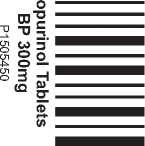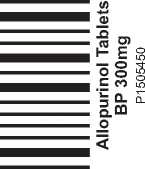Allopurinol Tablets Bp 300Mg
Out of date information, search another>


PACKAGE LEAFLET: INFORMATION FOR THE USER
Allopurinol Tablets BP 300mg
(aMopurinol)
Read all of this leaflet carefully before you start taking this medicine.
• Keepthis leaflet. You may need to read it again.
• Ifyouhave any further questions, ask your doctor or pharmacist.
• Thismedicine has been prescribed for you. Do not pass it on to others. It may harm them, even if their symptoms are the same as yours.
• Ifanyofthe side effects gets serious, or if you notice any side effects not listed in this leaflet, please tell your doctor or pharmacist.
In this leaflet:
1. What allopurinol Tablets are and what they are used for
2. Before you take Allopurinol Tablets
3. How to take Allopurinol Tablets
4. Possible side effects
5. How to store Allopurinol Tablets
6. Further information
1. WHAT ALLOPURINOL TABLETS ARE AND WHAT THEY ARE USED FOR
Allopurinol Tablets belong to a group of medicines called enzyme inhibitors. Allopurinol Tablets are used in:
• longterm prevention of gout
• prevention of kidney stones
• treatment of high levels of uric acid associated with tumors and their treatment
• certainenzyme disorder in particular Lesch Nyhan syndrome
2. BEFORE YOU TAKE ALLOPURINOL TABLETS
Serious skin rashes (Hypersensitivity syndrome, Stevens- Johnson syndrome, toxic epidermal necrolysis) have been reported with the use of allopurinol. Frequently, the rash can involve ulcers of the mouth, throat, nose, genitals and conjunctivitis (red and swollen eyes). These serious skin rashes are often preceded by influenza-like symptoms fever, headache, body ache (flu-like symptoms). The rash may progress to widespread blistering and peeling of the skin.
These serious skin reactions can be more common in people of Han Chinese or Thai origin.
If you develop a rash or these skin symptoms, stop taking allopurinol and contact your doctor immediately.
Do not take Allopurinol Tablets If:
• youare sensitive or allergic to Allopurinol or any of the ingredients in the tablets (listed in section 6).
Do not take Allopurinol Tablets if the above applies to you. If you are not sure, talk to your doctor or pharmacist before taking Allopurinol Tablets.
Take special care with Allopurinol Tablets
Check with your doctor or pharmacist before taking Allopurinol Tablets if:
• Youhave problems with your liver or kidney. Your doctor may give you a lower dose or ask you to take it less often that each day. They will also monitor you more closely
• Youhave heart problems or high blood pressure
• Youare currently having an attack of gout
If you are not sure if any of the above applies to you, talk to your doctor or pharmacist before taking Allopurinol Tablets.
Taking other medicines
Please inform your doctor if you are taking or have recently taken any other medicines, including those obtained without prescription.
Before taking Allopurinol Tablets, tell your doctor if you are already taking any of the following:
• 6-mercaptopurine used to treat cancer of the blood cells
• medicines used to reduce your immune response (immunosuppressant) e.g. Azathiopine, ciclosporin
• adenine arabinoside
• otherproducts used to treat high levels of uric acid e.g. probenecid
• medicines used to reduce excess water in the body (thiazide diuretics)
• antibiotics e.g. amoxicillin
• aspirin
• theophylline, used for breathing problems
• medicines used for fits (epilepsy) e.g. Phenytoin
• didanosine, used to treat HIV infection
• medicines used to treat diabetes
• medicines used to thin your blood (anticoagulants) such as warfarin
• medicines for heart problems or high blood pressure such as 'ACE inhibitors' or water tablets (diuretics)
Pregnancy and breast-feeding
Talk to your doctor before taking Allopurinol Tablets if you are pregnant, might become pregnant or are breast feeding.
Driving and using machines
Allopurinol Tablets may cause drowsiness, affect your co-ordination, affect your vision or make you feel dizzy. If you experience these symptoms you should avoid driving or operating machinery.
Important information about some of the ingredients
If you have been told by your doctor that you have an intolerance to some sugars, contact your doctor before taking this medicinal product as it contains lactose.
3. HOW TO TAKE ALLOPURINOL TABLETS
Always take Allopurinol tablets exactly as your doctor has told you. You should check with your doctor or pharmacist if you are not sure.
For oral use only. Allopurinol Tablets should be swallowed, without chewing, with half a glassful of water during or after meals.
Adults:(Over 18 years)
The usual dose ranges from 100 to 900 mg each day.
Initially 100 to 300mg per day taken as a single dose.
Children:(under 15 years)
The recommended dose is 10 to 20 milligrams per kilogram body weight/day up to a maximum of 400mg daily.
Use in the elderly: (over 65 years)
The lowest dosage possible will be given as recommended by your doctor.
Use in patients with kidney damage:
The level and frequency of dosage should be recommended by your doctor. The dose may need to be decreased depending on blood uric acid levels due to kidney damage which mean it takes longer to excrete Allopurinol.
Use in patients on kidney dialysis:
Allopurinol and its by-products are removed by dialysis. If dialysis is done frequently 300 to 400mg of Allopurinol may be given after each dialysis with none in the interim.
The dose should be adjusted by checking blood uric acid and/or urinary uric acid levels at appropriate intervals which will be done by your doctor. It might take one to three weeks for blood and/or urinary uric acid to return to the desired levels.
If you take more Allopurinol Tablets than you should
If you or someone else swallow several of these tablets together, contact your doctor or nearest hospital emergency department immediately. Always take the box, this leaflet and any tablets that are left over with you, if you can.
If you forget to take Allopurinol Tablets
If you miss a dose, take it as soon as you remember and carry on as before. If it is almost time for your next dose, skip the forgotten dose and continue as usual. Do not take a double dose to make up for a forgotten dose.
If you stop taking Allopurinol Tablets
Do not stop taking Allopurinol 100mg tablets without first discussing it with your doctor.
If you have any further questions on the use of this product, ask your doctor or pharmacist.
POSSIBLE SIDE EFFECTS
Like all medicines, Allopurinol Tablets can cause side effects, although not everyone gets them.
If you experience any of the following, stop your tablets and tell your doctor immediately: Allergic reactions
If you have an allergic reaction, stop taking Allopurinol tablets and see a doctor or hospital emergency department straight away. The signs include:
• Skin rash, flaking skin, boils, fever or sore lips and mouth and in extreme cases hepatitis
• Very rarely signs may include sudden wheeziness, fluttering or tightness in the chest and collapse
Do not take any more tablets unless your doctor tells you to do so.
The following has also been reported.
Common (affects less than 1 in 10 people)
• rash
Uncommon (affects less than 1 in 100 people)
• Feeling sick (nausea) or being sick (vomiting), occasionally with blood
• Hypersensitivity reactions
• Changes in liver function tests.
Rare (affects less than 1 in 1000 people)
• Swelling of your eyelids, face or lips; with or without lumpy skin rush (hives) anywhere on the body (Steven -Johnson’s syndrome)
• fever and chills, headache, aching muscles (flu-like symptoms) and generally feeling unwell
• any changes to your skin, for example ulcers of the mouth, throat, nose, genitals and conjunctivitis (red and swollen eyes), widespread blisters or peeling
• Serious hypersensitivity reactions involving fever, skin rash, joint pain, and abnormalities in blood and liver function tests (these may be signs of a multi-organ sensitivity disorder)
• Hepatitis (Inflammation of liver)
Very rare side effects (affects less than 1 in 10000 people)
• Male infertility or erectile dysfunction
• Enlargement of the breasts in men
• General feeling of being unwell
• Build up of fluid leading to swelling (oedema), particularly of your ankles
• Hair loss or discoloration
• Feeling of weakness
• Serious allergic reaction which causes swelling of face or throat
• Hair loss or discoloration
• Liver or kidney problems
• Blood in your urine
• A change in your normal bowel habit
• A change in taste
• Infections of the skin, including scalp
• Severe reduction in white blood cells which makes infections more likely
• Reduction in red blood cells which can make skin pale and causes weakness or breathlessness
• Bruising more easily than usual or you may develop a sore throat or other signs of an infection. Tell your doctor as soon as possible. Occasionally Allopurinol Tablets may affect your blood or lymph system. These effects usually occur in people with liver and kidney problems
• Joint pain or painful swelling in your groin, armpits or neck
• Feeling thirsty, tired and losing weight, these may be symptoms of diabetes. Your doctor may wish to measure the level sugar in your blood to check of this is happening
• High levels of cholesterol in your blood (hyperlipidemia)
• Depression
• Headache, dizziness, drowsiness or disturbance of your vision
• Muscles (paralysis) or loss of consciousness
• Fits (convulsions)
• Cataracts
• Chest pain, high blood pressure or a slow pulse
• Yellowing of the skin and eyes (jaundice)
• Weakness, numbness, unsteadiness on your feet, unable to move
• Paraesthesia (Sensation of tingling)
• Stomatitis (Oral inflammation)
If any the side effects get serious, or if you notice any side effects not listed in this leaflet, please tell your doctor or pharmacist.
5. HOW TO STORE ALLOPURINOL TABLETS
Keep out of the reach and sight of children.
Do not store above 25°C. Store in the original package and keep containers tightly closed.
Do not use the tablets after the expiry date is stated on the label.
Medicines should not be disposed of via wastewater or household waste. Ask your pharmacist how to dispose of medicines no longer required. These measures will help to protect the environment.
6. FURTHER INFORMATION
What Allopurinol Tablets contains The active ingredient is Allopurinol.
The other substances are Lactose monohydrate, Maize Starch, Povidone K30, Sodium Starch Glycollate and Magnesium Stearate (See Section 2 'Important information about some of the ingredients of Allopurinol tablets)'.
What Allopurinol Tablets looks like and contents of the pack
Allopurinol Tablets are white, round, biconvex tablets embossed with MAL 100 on one side and plain on the reverse.
The product is available in containers of 1000, 500, 250, 100, 84, 70, 56, 42, 28, 21, 15 and 14 tablets. They are also available in blister packs of 84, 70, 56, 42, 28, 21, 15 and 14 tablets (no all pack sizes may be marketed).
Marketing Authorisation Holder and Manufacturer
Milpharm Limited,
Ares, Odyssey Business Park,
West End Road,
South Ruislip, HA4 6QD United Kingdom
This leaflet was last revised in 06/2013
P1505450